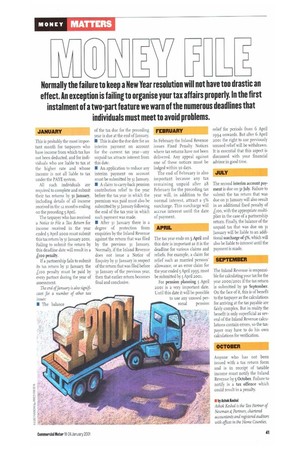Normally the failure to keep a New Year resolution will
Page 43

If you've noticed an error in this article please click here to report it so we can fix it.
not have too drastic an effect. An exception is failing to organise your tax affairs properly. In the first instalment of a two-part feature we warn of the numerous deadlines that individuals must meet to avoid problems.
JANUARY fins is probably the most important month for taxpayers who have income from which tax has riot been deducted, and for individuals who are liable to tax at the higher rate and whose income is not all liable to tax under the PAYE system.
All such individuals are required to complete and submit their tax returns by 31 January, including details of all income received in the 12 months ending on the preceding 5 April.
The taxpayer who has received a Notice to File a Tax Return for income received in the year ended 5 April 2000 must submit this tax return by 31 January 2001. Failing to submit the return by this deadline date will result in a Doc, penalty.
If a partnership fails to submit its tax return by 31 January, the Lioo penalty must be paid by every partner during the year of assessment.
The end ofJanuary is also significant for a number of other tax issues
• The balance of the tax due for the preceding year is due at the end of January.
• This is also the due date for an interim payment on account for the current tax year—any unpaid tax attracts interest from this date.
• An application to reduce any interim payment on account must be submitted by 31 January.
• A claim to carry-back pension contribution relief to the year before the tax year in which the premium was paid must also be submitted by 31 January following the end of the tax year in which such payment was made.
• After 31 January there is a degree of protection from enquiries by the Inland Revenue against the return that was filed by the previous 31 January. Normally, if the Inland Revenue does not issue a Notice of Enquiry by 31 January in respect of the return that was filed before 31 January of the previous year, then that earlier return becomes final and conclusive. FEBRUARY
In February the Inland Revenue issues Fixed Penalty Notices where tax returns have not been delivered. Any appeal against one of these notices must be lodged within 30 days.
The end of February is also important because any tax remaining unpaid after 28 February for the preceding tax year will, in addition to the normal interest, attract a 5% surcharge. This surcharge will accrue interest until the date of payment.
1111111•1111111111111111
The tax year ends on 5 April and this date is important as it is the deadline for various claims and reliefs. For example, a claim for relief such as married persons' allowance, or an error claim for the year ended 5 April 1995, must be submitted by 5 April 2001.
For pension planning 5 April 2001 is a very important date. Until this date it will be possible to use any unused per
sonal pension
relief for periods from 6 April 1994 onwards. But after 6 April 2001 the right to use previously unused relief will be withdrawn. It is essential that this aspect is discussed with your financial advisor in good time.
The second interim account payment is due on 31 July. Failure to submit the tax return that was due on 31 January will also result in an additional fixed penalty of Lloo, with the appropriate multiplier in the case of a partnership return. Finally, the balance of the unpaid tax that was due on 31 January will be liable to an additional surcharge of 5%, which will also be liable to interest until the payment is made.
SEPTEMBER The Inland Revenue is responsible for calculating your tax for the year 2000/2001 if the tax return is submitted by 30 September. On the face of it, this is of benefit to the taxpayer as the calculations for arriving at the tax payable are fairly complex. But in reality the benefit is only superficial as several of the Inland Revenue calculations contain errors, so the taxpayer may have to do his own calculations for verification.
OCTOBER
Anyone who has not been issued with a tax return form and is in receipt of taxable income must notify the Inland Revenue by 5 October. Failure to notify is a tax offence which could result in a penalty.
• by Ashok Koshal
Ashok Koshal is the Tax Partner of Newman a; Partners, chartered accountants and registered auditors with offices in the Home Counties.
































































































